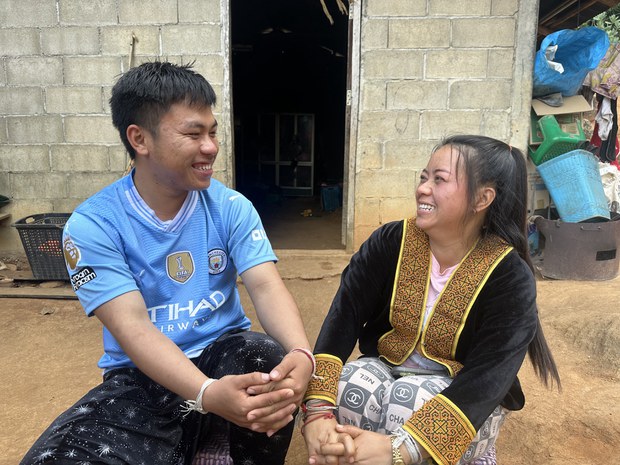Hamas attacks, Israel's bombs, and freedom: A Thai hostage tells his story
Gong Saelao was one of the many migrant workers grabbed in the 7 October terrorist attack. Released in late November, for weeks he thought he “might not return home alive". Over time, his kidnappers became friendlier. The fate of the people still held in Gaza remains a mystery. US President Biden urges “a ceasefire [. . .] for the next six, eight weeks”.
Jerusalem (AsiaNews) – Gong Saelao, a Thai farmer who went to the Middle East in search of work, still remembers the terrible moments when he was grabbed by Hamas terrorists on 7 October and the two months he spent in captivity.
He remembers the sound of gunfire and the explosions coming closer, his attempt to hide in his bedroom, and the arrival of a group of attackers with pistols and rifles in their hands who blindfolded him, chained his wrists and ankles, and dragged him away from the farm in southern Israel where he worked to various hiding places in the Gaza Strip.
Today, back home, he is trying, not without difficulty, to overcome the psychological and physical suffering he endured in the Palestinian territory. While acknowledging acts of kindness by his captors, he remembers how he felt: “I was so scared because I didn’t know what they were thinking,” he told BenarNews.
He regained his freedom on 29 November, one of 23 Thai hostages released by Hamas after nearly two months, but still remembers. “I thought I wouldn’t return home alive,” he said.
A little more than six months after the attack that left about 1,200 people dead in Israel and the Jewish state's response that caused more than 33,000 deaths, largely civilians, including women and children, the hostage situation remains uncertain.
Most of those still held by Hamas are Israelis, but dozens are foreigners, mostly Asians, their fate forgotten by international media.
Nearly 30,000 Thais used to work in Israel before the war began, most of them farm labourers from the country’s poor northeastern regions.
Gong, an ethnic Hmong, talks about his ordeal from the home he shares with his 28-year-old wife Suntree (pictured), in the northern province of Chiang Rai.
“Five Thais who were outside were detained before me and taken to another location,” he said.
Before his own kidnapping, he live-streamed on social media the explosions and rockets flying across the sky. But when his wife tried to call him later that day, he did not pick up and she immediately thought the worst.
Gong spent several weeks in different hideaways in Gaza, like others, trying to escape the increasingly intense Israeli bombardment.
In the beginning, the kidnappers were aloof if not hostile, but over time they became friendlier. He was given rice, chicken, salad, and bread – sometimes with butter or cheese – as well as medicine when he got sick. Eventually, he began to hope that he “might return home alive.”
With war raging outside, he spent his time of imprisonment chained, guarded, and isolated from the rest of his compatriots, suffering from migraines and stress.
“They kept telling me not to worry, that I would definitely go home tomorrow,” Gong said. “They said Thailand is good, they don’t hurt Thai people.”
In the end, they kept their word and, after a "farewell meal", handed him over (blindfolded) to another group who finally handed him over to paramedics in a UN vehicle.
“It was like I was lifted up from a black hole of death and reborn,” he said. On 4 December, with five other former hostages, he returned to Thailand.
Since the start of the war, about 15,000 Thai workers left for home, but 60 per cent say they want to return to Israel as soon as the situation calms down.
Gong is not one of them. “I was lucky last time, but I may not be so lucky the next,” he said.
Among those who have returned home after time in captivity, a couple crowned their love by marrying in March. Nutthawaree Munkan and Boonthom Pankhong spent 50 days in Hamas’s hands and were freed in late November.
The two had fallen in love and begun a relationship while working as farm workers in a "moshav"[*] in southern Israel, but were separated at the time of the attack.
After their release, they returned to Thailand and got married in a small, very private but emotionally charged ceremony. “I find it hard to understand how the remaining hostages will survive. I can’t stop thinking about them.”
In fact, Hamas is still believed to be holding an unspecified number of hostages taken at the time of the attack, but there is no hard evidence that they are still alive, while intense truce negotiations are still going on.
Many of the hostages come from different countries in Asia, like Thailand and Nepal, and represent the "forgotten” faces of this tragedy.
One of them is Chinese-Israeli Noa Argamani. Nothing is known about her fate while her parent's repeated appeals for her release have been to no avail. Her mother, who is suffering from terminal cancer, would like to hug her one more time before she dies.
Finally, on the war front, US President Joe Biden said that what Israeli Prime Minister Benjamin Netanyahu “is doing is a mistake”, and that he should accept a ceasefire "for the next six, eight weeks" because "there’s no excuse" for not sending aid to the Gaza Strip.
Israeli Defence Minister Yoav Gallant has contradicted his own prime minister saying that there is no "certain" date for the invasion of Rafah, while a top UN official slams the international community for losing its "moral compass" on war-ravaged Gaza.
(Photo by BenarNews)
[*] A type of cooperative agricultural community of individual farms.
27/10/2023 19:18
15/01/2024 19:24
17/05/2021 10:29







.png)










